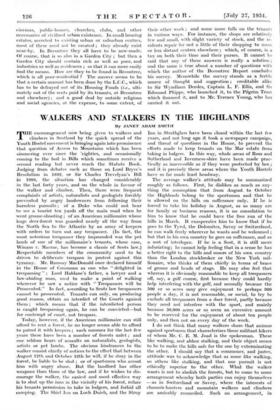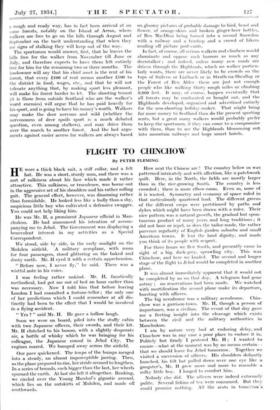WALKERS AND STALKERS IN THE HIGHLANDS
By JANET ADAM SMITH
THE encouragement now being given to walkers and climbers in Scotland by the quick spread of the Youth Hostel movement is bringing again into prominence that question of Access to Mountains' which has been simmering ever since the 'eighties, and occasionally coming to the boil in Bills which sometimes receive a second reading but never reach the Statute Book. Judging from debates such as those on Lord Bryce's Resolution in 1892, or Sir Charles Trevelyan's Bill in 1908, the situation has changed considerably in the last forty years, and on the whole in favour of the walker and climber. Then, there were frequent complaints of artists, naturalists and geologists forcibly prevented by angry landowners from following their harmless pursuits ; of a Duke who could not bear to see a tourist ten yards off the main road when he went grouse-shooting ; of an American millionaire whose huge deer-forest was guarded nearly all the way from the North Sea to the Atlantic by an army of keepers with orders to turn out any trespasser. (In fact, the most notorious trespasser they impounded was the pet lamb of one of the millionaire's tenants, whose case, Winans v. Macrae, has become a classic of Scots law.) Respectable members of the community used to be driven to deliberate trespass in protest against this tyranny. Mr. Ramsay MacDonald once declared himself in the House of Commons as one who " delighted in trespassing " ; Lord Haldane's father, a lawyer and a law-abiding man, used to make a point of walking wherever he saw a notice with ".Trespassers will be Prosecuted." In fact, according to Scots law trespassers cannot be prosecuted. Tenants can only, on producing good reason, obtain an interdict of the Courts against them ; which means that if the interdicted person is caught trespassing again, he can be ,convicted—but for contempt of court, not trespass.
Today, however, if the American millionaire can still afford to rent a forest, he no longer seems able to afford to patrol it with keepers ; each summer for the last few years there have been a number of forests unlet ; and one seldom hears of assaults on naturalists, geologists, artists or pet lambs. The obvious hindrances to the walker consist chiefly of notices to the effect that between August 12th and October 12th he will, if he stray in the forest, be liable to be shot ; or of sportsmen who accost him with angry abuse. But the landlord has other weapons than those of the law, and if he wishes to dis- courage the walker, the easiest and most effective way is to shut up the inns in the vicinity of his forest, refuse his tenants permission to take in lodgers, and forbid all camping. The Shiel Inn on Loch Duich, and the Struy Inn in Strathglass have been closed within the last few years, and not long ago it took a newspaper campaign, and threat of questions in the House, to prevent the efforts made to keep tenants on. the Mar estate from taking in lodgers. In this way, whole areas of Ross and Sutherland and Inverness-shire have been made prac- tically as inaccessible as if they were protected by law ; and it is precisely these areas where the Youth Hostels have so far made least headway.
The average walker's attitude may be summarized roughly as follows. First, he dislikes as much as any- thing the assumption that from August to October the Highlands belong to the sportsman and that he is allowed on the hills on sufferance only. If he is forced to take his holiday in August, as so many are for family or business reasons, it is no consolation to him to know that he could have the free run of the hills in March. It exasperates him to know that if he goes to the Tyrol, the Dolomites, Savoy or Switzerland, he can walk freely wherever he wants and be welcomed ; but that in his own country he goes on sufferance, and as a sort of interloper.- If he is a Scot, it is still more infuriating; he cannot help feeling that in a sense he has a better right to the hills and moors of his own country than the London stockbroker or the New York mil- lionaire, who thinks of them chiefly in terms of brace of grouse and heads of stags. He may also feel that whereas it is obviously reasonable to keep all trespassers off, say, a golf course, first because they could hardly help interfering with the golf, and secondly because the 500 or so acres may give enjoyment to perhaps 300 people a day, it is not reasonable, or social, to try to exclude all trespassers from a deer forest, partly because they need not interfere with the sport, and mainly because 50,000 acres or so seem an excessive amount to be reserved for the• enjoyment of about ten people only, and then not on every day of the week.
I do not think that many walkers share that animus against sportsmen that characterizes those militant hikers of whom Mr. C. E. M. Joad is the spokesman. These like walking, and abhor stalking, and their object .seems to be to make the hills safe for the one by exterminating the other. I should say that a commoner, and juster, attitude was to acknowledge that as some like walking, so others like stalking, and that one pursuit is not ethically superior to the other. What the walker wants is not to abolish the forests, but to come to some arrangement whereby both parties can enjoy themselves —as in Switzerland or Savoy, where the interests of chamois-hunters and mountain walkers and climbers are amicably reconciled. Such an arrangement, in a rough and ready way, has in fact been arrived at on some forests, notably on the Island of Arran, where walkers are free to go on the hills through August and September on the tacit understanding that when they see signs of stalking they will keep out of the way.
The sportsman would answer, first, that he leaves the hills free for the walker from November till June or July, and therefore expects to have them left entirely free for him for the remaining two or three months. The landowner will say that his chief asset is the rent of his forest, that every £100 of rent means another £100 to the district in food, wages, etc., and that he will not tolerate anything that, by making sport less pleasant, will make his forest harder to let. The shooting tenant (it is those from outside Scotland who are the walker's worst enemies) will argue that he has paid heavily for his sport, and is going to have his money's worth. Walkers may make the deer nervous and wild (whether the nervousness of deer spoils sport is a much debated question, even among stalkers), and may drive them over the march to another forest. And the last argu- ments against easier access for walkers are always based on gloomy pictures of probable damage to bird, beast and flower, of orange-skins and broken ginger-beer bottles, of Ben MacDhui being turned into a second Snowdon with a railway and a teashop and a crowd of hikers sending off picture post-cards.
In fact, of course, all serious walkers and climbers would abominate and oppose such horrors as much as any deerstalker ; and indeed, unless many new roads arc driven through the Highlands, which no walker particu- larly wants, there are never likely to be crowds on the tops of Suilven or Liathach or in Strath-na-Sheallag or the Forest of Ben Alder—there are just not enough people who like walking thirty rough miles or climbing 3,000 feet. It may, of course, happen eventually that all forests may be confiscated or bought out, and the Highlands developed, organized and advertised entirely for the non-shooting holiday-maker. That might bring far more money to Scotland than do the present sporting rents, but a great many walkers would 'probably prefer to keep the sportsmen, if they can come to a compromise with them, than to see the Highlands blossoming out into mountain railways and large smart hotels.



































 Previous page
Previous page